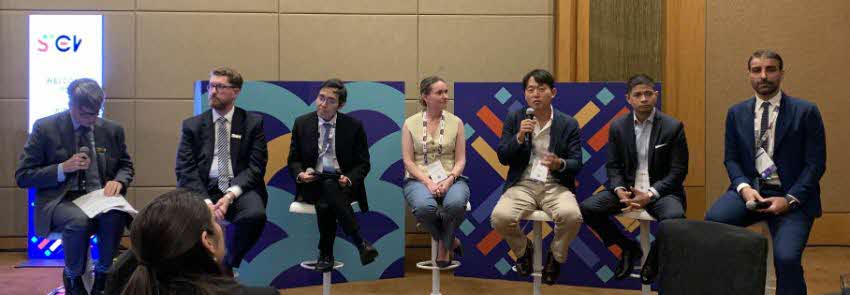How carbon management technologies and renewable energy sources can help address the climate change challenge.

The Energy Research Institute @ NTU (ERI@N) and the US Department of Commerce came together to host a thought-provoking roundtable discussion on "Low Carbon Technology in Decarbonising the Energy Sector".
The session cast the spotlight on two pivotal technologies—carbon capture and storage (CCS) and geothermal energy— shaping the discussions on the energy transition.
Kenneth Vincent, Director of the Office of Asian Affairs, Department of Energy, US, commenced by shedding light on the benefits of the US-ASEAN collaboration. This partnership focuses on exploring geologic storage of CO2 and geothermal energy. Mr Vincent shared insights into the US experience with CCS and geothermal. He emphasised the global need for CO2 removal and renewable energy solutions, along with the challenges and opportunities involved.
Following Mr Vincent's ambitious goal to reduce the cost of direct CO2 capture to less than US$100 per tonne in just one decade, Anna Cron, Environmental Technologies Trade Specialist, US Department of Commerce, delved into an overview of the CCS landscape in ASEAN.
Ms Cron also highlighted expansion plans for CO2 facilities worldwide, with projects now in 45 countries, including 10 in Asia Pacific and another 10 in the Middle East. She noted that at least seven potential carbon capture, utilisation and storage (CCUS) projects in early development phases in Southeast Asia, including in Indonesia, Singapore, and Malaysia.
Professor Alessandro Romagnoli, Energy Research Institute @ Nanyang Technological University, next shared the latest R&D findings in ASEAN’s geothermal landscape. He emphasised that Singapore is well-suited for geothermal exploration due to its significantly higher heat flow—at two times more—compared to the continental average.
The roundtable then transitioned to a panel discussion moderated by Ambassador Brian D. McFeeters (ret.), Senior Vice President and Regional Managing Director, US ASEAN Business Council. He was joined by experts from the US Department of Energy, Energy Market Authority, ExxonMobil, Capture6, Energy Development Corporation, and Energy Research Institute @ Nanyang Technological University. They discussed the role of low carbon technologies in decarbonising the energy sector.
In closing, Mr Miguel De Vera of the Energy Development Corporation (EDC) highlighted the potential of offshore wind as the next renewable energy frontier in ASEAN, citing projects in Vietnam.
Follow us on X (formerly Twitter) and Telegram to get the latest updates.